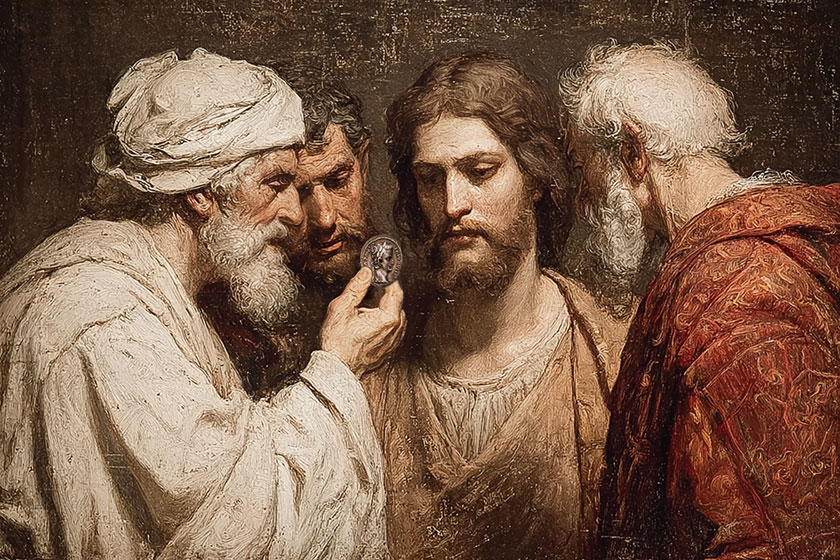Hardly any other religion or philosophy attaches as much importance to the power of forgiveness as the teachings of Jesus. It calls us to grace, mercy, and even to love our enemies. This is impressively demonstrated in the life of Jesus: despite betrayal, slander, and cruel execution, He says on the cross, ‘Father, forgive them, for they do not know what they do.’ But why is forgiveness so central, and why is it often so difficult for us when we experience injustice? This article highlights the universal dimension of forgiveness, which signifies our unity with God—that is, with everything that is.
Self-knowledge—the foundation of genuine and fundamental forgiveness
The idea that genuine forgiveness and true mercy are linked to sincerely practiced self-knowledge is one that receives little attention today—yet it is central. In the Sermon on the Mount, Jesus links this idea directly to mercy:
Blessed are the merciful, for they shall obtain mercy.
Blessed are the pure in heart, for they shall see God.Matthew 5:7-8
What does a ‘pure heart’ mean in this context? Contrary to popular belief, this is not about inner perfection or flawlessness. Rather, Jesus describes the ability to become aware of one’s own human weaknesses, mistakes, and errors—in other words, to see oneself as one truly is. And Jesus equates this contemplation of the truth (about ourselves) with the contemplation of God. The Jewish philosopher, Simone Weil, succinctly formulated this idea:
Purity is the ability to contemplate one’s own defilement.
Simone Weil: ‘Gravity and Grace’
Purity does not consist in the absence of faults but in the courageous willingness to acknowledge one’s own imperfection. But how does this self-knowledge lead to seeing God? In Jesus‘ message, God stands for truth. As He explains during his interrogation before Pilate:
I was born and came into the world to bear witness to the truth. Whoever is from the truth hears my voice. John 18:37
Through honest self-examination, we recognize our weaknesses and thus the divine truth about ourselves. Contemplating the truth about ourselves is therefore equivalent to ‘seeing’ God. And so it is also the unvarnished insight into ourselves that creates the basis for the Christian idea of forgiveness.
Guilt as a path to forgiveness
Our guilt as a door to grace
Jesus taught us that our guilt is not only a burden but also an opportunity to practice forgiveness and mercy. This idea may seem surprising at first, but it contains a joyful message: our human weaknesses should bring us closer to God and our fellow human beings. This article is about how Jesus redefines the concept of sin and uses parables to show us how we can learn grace, forgiveness, and mercy through insight into our human fallibility.
Sin as meaning: recognizing God’s work
When our guilt leads us to forgiveness, it becomes a necessity and thus even something good. This means that when we understand sin in this way, it gains a deep meaning as part of our human nature. God gives meaning and significance to everything, even to the weak and seemingly meaningless, because He is the spirit that permeates all things.
Jesus instructed us that insight into our guilt should enable us to practice grace and forgiveness.
God created us as sinners so that we might learn mercy through our imperfection.
Meister Eckhart’s view: sin and true repentance
Meister Eckhart also pointed to this fundamental truth. It was a view that his contemporaries found incomprehensible:
‘The good man should conform his will to the divine will in such a way that he himself wants everything that God wants: because God in a certain sense wants me to have sinned, I did not want to have committed any sins, and that is true repentance.’„
From the indictment against Meister Eckhart, 1260–1327
Parable: Learning forgiveness through humility
After considering the meaning of sin as an opportunity for forgiveness, Jesus illustrates this idea vividly in a parable: the parable of the unforgiving servant. It is about a servant whose large debt is forgiven but is not willing to forgive a smaller debt owed to him by one of his fellow servants.
The kingdom of heaven is like a king who wanted to settle accounts with his servants. One owed him an enormous sum—ten thousand talents. Since he could not pay, the king ordered that he, his family, and all his possessions be sold. The servant fell to his knees and begged, ‘Give me time; I will pay you back everything!’ The king took pity on him, released him, and forgave the entire debt. But when this servant met a fellow servant who owed him only a hundred denarii, he grabbed him, choked him, and demanded, ‘Pay me what you owe me!’ The fellow servant begged for patience, but the servant remained hard-hearted and had him thrown into prison until the debt was paid. When the other servants saw this, they reported it to the king. He called the servant to him and said, ‘You ungrateful servant! I forgave your huge debt because you begged me. Shouldn’t you have forgiven your fellow servant as I forgave you?’ Angry, the king handed him over to the guards until he had paid back everything. Jesus concluded, ‘So will my heavenly Father do to you if you do not forgive from your heart.’ (cf. Matthew 18:23-35)
This parable shows that those who experience God’s forgiveness are called to forgive themselves. Our own guilt should teach us grace and humility, not harshness and unforgiveness.
Accepting the cross: healing through weakness
In this way, our weakness becomes a meaningful and necessary burden that we are to bear, just as Jesus took up and carried His cross. The healing of guilt comes through the realization that in God, even weakness and suffering have meaning and ultimately serve us:
Then He said to them all, “If anyone wants to follow me, let him deny himself and take up his cross daily and follow me. For whoever wants to save his life will lose it, but whoever loses his life for my sake will save it. Luke 9:23–24
The splinter and the beam: self-examination first
Another parable of Jesus deepens this message by calling us to self-reflection, through which we are to be freed from the thought of condemnation:
“Do not judge, so that you will not be judged. For as you judge, so you will be judged; and with the measure you use, it will be measured to you. Why do you see the splinter in your brother’s eye, but do not notice the beam in your own eye? How can you say, ‘Let me take the splinter out of your eye,’ when there is a beam in your own eye? You hypocrite, first take the plank out of your own eye, and then you will see clearly to remove the speck from your brother’s eye.“ Matthew 7:1-5
This image illustrates that only when we recognize our own mistakes can we treat others with understanding and grace. Instead of judging, we should examine ourselves and show compassion.
Forgiveness as a path to healing
Our human weakness is not an obstacle, but a path:
Through insight into our weaknesses, we learn that we ourselves need the forgiveness that God grants us so that we can pass it on.
In this way, forgiveness leads to healing—for us and for those around us.
A life in grace
Jesus‘ message is clear: our weaknesses are not obstacles, but paths to greater compassion and forgiveness. By accepting our fallibility, we learn not to judge others but to treat them with mercy. This insight frees us from the burden of guilt and opens us to God’s truth, in which neither guilt nor accusation can exist.
How can we live this message in our daily lives? Perhaps by forgiving someone today who has upset or hurt us. In this way, we become one with God, to whom everything—even weakness—serves to bring about good.
Recognising the good in evil
How can something good come out of something evil? This question preoccupies many people, especially in difficult times. Jesus‘ teaching shows us a way: evil remains evil as long as we do not recognize God’s will in it. Only through this insight and our trust can it become good. In his Passion, Jesus shows how He lived this out and what we can learn from it.
Evil and the will of God
Evil is not inherently good. Suffering, injustice, and failure must remain wrong and evil so long as we do not see a deeper meaning in them. Jesus teaches us that evil can become good if we recognize God’s will in it. However, this insight does not come automatically—it is individual and depends on our trust in Jesus‘ words. It would therefore be wrong to say to someone, ‘Your suffering is good because it is God’s will.’ Such words can come across as cynical. Good only comes about when the person affected, like Jesus Christ, recognizes God’s work in their suffering and trustingly consents to it. However, each person must walk this path entirely for themselves:
‘Strive to enter through the narrow gate; for many, I tell you, will seek to enter and will not be able.’ Luke 13:24
The Passion of Jesus as an example
Jesus Himself exemplified this path. In His Passion—His suffering, His defeat, and His death on the cross—He recognized the will of God. Despite His pain, He trusted that God would bring good out of it.
Facing His impending suffering, He prayed:
“My Father, if it is possible, let this cup pass from me; yet not as I will, but as you will.” Matthew 26:39
Through this trust, Jesus transformed evil into something good. He knew that even in His greatest misfortune there was also happiness. Happiness is based on the trust that where God’s will is recognized, it must lead to good. Jesus shows that those who trust in God’s work will find hope, even in the darkest moments. Why? Because God cannot disappoint hope that is placed in Him. If He did, God would be acting against Himself and would cease to be God.
Hope through trust
Jesus said to His disciples, ‘It is good for you that I am going away. For if I do not go away, the Comforter will not come to you. But if I go, I will send Him to you.’ John 16:5-7
At first, these words sound paradoxical. How could it be ‘good’ that Jesus was crucified? But He knew that His departure was part of God’s plan, which would bring forth a spirit of comfort. Jesus trusted that God’s will always and exclusively brings about good—even if it initially appears to be a loss.
Where God’s will is done: forgiveness, healing, and the overcoming of evil
Jesus‘ forgiveness on the cross
The forgiveness that Jesus grants His enemies on the cross is of universal significance. As He dies, He mouths the words:
‘Father, forgive them, for they do not know what they do.’ Luke 23:34
This request shows the depth of His sacrifice: Jesus forgives His enemies because He recognizes and accepts God’s will in His passion. Where God’s will is done, guilt and accusation come to an end. This thought forms the basis for the redemption of the world and the forgiveness that Jesus makes possible.
Ignorance and the necessity of evil
Jesus‘ enemies acted in ignorance, as He Himself emphasizes. This ignorance exonerates them in a deeper sense:
- Those who are ignorant are not criminally responsible.
- Had they known what they were doing, they would have acted differently.
- But without their actions, the world would not have been redeemed.
Their ignorance was therefore necessary for the redemption through Jesus‘ Passion to be realized. It follows that
what happens in accordance with God’s will cannot be blamed, for it is God’s work.
Jesus‘ request for forgiveness is a logical consequence of this reasoning.
The power of divine forgiveness
One possible objection could be that Jesus does not forgive Himself but asks God to forgive His enemies. But which forgiveness weighs more: that of a human being or that of God?
The forgiveness that Jesus asks for is divine, all-encompassing, and therefore objective. It removes guilt and leads to healing. Jesus recognizes God’s will in all events and asks for the highest forgiveness for His enemies. And He shares with us this glory that was given to Him by the Father:
‘And I have given them the glory that you gave me, that they may be one, as we are one, I in them and you in me.’ John 17:22-23
Through this gift, we too are enabled to pray for those who wrong us and thus obtain objective forgiveness from God.
Love for one’s enemies
Jesus calls us to go beyond human standards:
“Love your enemies, bless those who curse you, do good to those who hate you, and pray for those who spitefully deal with you.” Matthew 5:44-45
This commandment is rooted in the knowledge that even “evil” people unknowingly accomplish God’s work—indeed, they must accomplish it. In this sense, the Apostle Paul makes it clear to us:
‘And we know that all things work together for the good of those who love God.’ Romans 8:28
Jesus took injustice, suffering, and death upon Himself because he knew that God’s will was at work in them. Through this, suffering and death took on a new meaning for Him, through which the world could be overcome. Thus, in Christ, the righteous became sinner so that the sinner could become righteous:
For God made Him who knew no sin to be sin for us, so that we might become the righteousness of God in Him. 2 Corinthians 5:21
The mindset of Jesus: suffering as the path to resurrection
Jesus gives us a new perspective on injustice, suffering, and death. He shows us that everything God wants is good and will turn out well. His faith was based on the belief that everything subject to God’s will is immortal and must be resurrected as soon as His will is recognized in it. Why? Because what God wants cannot die. God is life itself. His will and His actions inevitably lead to life.
Through Jesus‘ consent to God’s will, injustice, suffering, and death became something necessary, true, and good. By trusting in this, we too can adopt this attitude:
- Through trusting surrender to God’s will, we find healing.
- In this attitude, we cannot perish, because God’s nature and will is life itself.
Forgiveness as the path to salvation
The Passion of Jesus reveals that even evil is determined in God and serves us, provided we trust in it. Through His forgiveness on the cross, Jesus shows how suffering is transformed into healing, injustice into justice, and death into life. By accepting His Spirit and consenting to God’s will, we become bearers of this forgiveness and sharers in His glory. Thus, guilt and accusation end where God’s good will is done.
Obtaining all-encompassing forgiveness
The indivisible unity of God
From what has been said so far, it is clear that in God there can be no accusation, no guilt, no contradiction, no opposite, and no adversary. Why is this so? Because God—who is truth itself—is indivisible. Therefore, the highest commandment in Judaism begins with the words:
‘Hear, O Israel: The Lord our God is one God.’ Deuteronomy 6:4
From the indivisible unity of God, it follows that God does not punish or judge anyone. For if that were possible, God would also punish or judge Himself. This, in turn, is impossible, since there is nothing but God, and He would thereby cease to be a single and indivisible God.
Divine judgment through the Son
In accordance with this fundamental truth, Jesus made it clear that God Himself does not judge anyone:
‘For the Father judges no one but has committed all judgment to the Son, that all may honour the Son just as they honour the Father.’ John 5:22
But how are we to understand that the Father has given all judgment to the Son? In His Passion, Jesus shows the nature of the divine judgment that has come through the Son and is carried out through Him.
Forgiveness as judgment on the cross
The judgment proclaimed by the Son on the cross means forgiveness for the enemies of God, which makes them necessary.
This may sound paradoxical, even absurd, but by granting forgiveness to His enemies from the cross, Jesus undoubtedly obtains their objective forgiveness through God, in whom all things are necessary and become.
Principles of divine truth
In order to grasp the dimension of this unheard-of thought, we must once again internalize the following:
- God is without division, separation, or contradiction.
- In God there is neither evil nor guilt nor accusation.
- God punishes and judges no one.
- God cannot be hindered by anything.
- All events serve God without exception.
- Nothing can oppose the will of God.
Becoming one with God
Jesus taught us that the salvation and glory of man are based on our becoming completely one with God. Just as the Son was one with the Father, so we too are to become one with God, whereby we become sons and God becomes our Father:
I do not pray for them alone, but also for those who will believe in Me through their word, that they may all be one, just as You, Father, are in Me, and I in You, that they also may be in Us, so that the world may believe that You sent Me. And I have given them the glory that You gave Me, that they may be one, just as we are one, I in them and You in Me, that they may be perfectly one, so that the world may know that You sent Me and loved them even as You loved Me. John 17:20-23
It follows that the judgment entrusted to the Son arises from a difference from God. The Son came to remove this difference.
The Son is not different from the Father, for it is the Son’s characteristic to know and do the Father’s will in all things.
The Son and the will of the Father
Just as all things serve God, so all things serve the Son of God without distinction. Even persecution, betrayal, slander, condemnation, and execution on the cross. The Son is able to recognize the will of the Father in all events. And so our salvation can only lie in accepting the mindset of Jesus. In this sense, Meister Eckhart said:
‘If you want to know God, you must not only be like the Son, but you must be the Son Himself.’ Meister Eckhart
That is why the Son forgave His enemies, because He is completely equal to the Father, whom all things serve. By granting forgiveness to His enemies, the Son proclaims that even the deeds of His enemies serve the good, since they, too, are subject to the will of the Father, from whom nothing can escape.
By forgiving, the Son honours the Father, because He proclaims the essence of the Father, whom all things serve.
The power of sacrifice
Omnipotence in powerlessness
The judgment that came in the form of the Son means forgiveness for the perpetrators who receive the forgiveness that Jesus Christ Himself taught and practiced against His enemies. What kind of forgiveness is this? It is the forgiveness that comes from the knowledge that God’s will is done wherever we recognize it and consent to it, even in injustice, suffering, and death. For where God’s will is done, all things must lead to good, since God is life itself and only good, only life, spirit, and meaning flow from Him. In this sense, Jesus explained:
„For this reason my Father loves me, because I lay down my life in order to take it up again. No one takes it from me, but I lay it down of my own accord. I have power to lay it down, and I have power to take it up again. This command I have received from my father.“ John 10:17
The reconciliation of the perpetrators
If the victim is able to forgive because they recognize God’s will even in the injustice they have experienced, then the perpetrators are atoned for before God. Why? Because they acted unknowingly according to God’s will, which only the victim knows here.
When everything temporal comes to an end on the last day, the perpetrators will also experience this, and they will be stunned. It will then be like in the days of Joseph, whom his brothers hated because he was their father’s favorite son, whom they declared dead, whom they sold into slavery, and who in the end forgave them from his heart because he recognized God’s will in his fate:
„And he said, ‚I am Joseph, your brother, whom you sold into Egypt. Now do not be distressed or angry with yourselves because you sold me here, for God sent me before you to preserve life. 1. Genesis 45:1
Judgment: The diminution of goodness
Jesus Christ came to proclaim the will of God, and this will is that in the Son all guilt ceases, because God is merciful and no guilt can exist in him. Those who are redeemed are those who, through the Son, are freed from accusation, guilt, and thoughts of retribution, just as the Son was free from accusation, guilt, and punishment.
Whoever believes in the Son and forgives as the Son has forgiven will himself become a son and will be free and will live.
Where accusation, guilt, punishment, and retribution cling to us, we will one day be confronted with them. To the extent that we were victims, we will receive comfort. To the extent that we were perpetrators, we will be measured by the measure we applied to others. We will receive what we believe in and what we hold fast to in our minds: either forgiveness or retribution. If we hold fast to forgiveness, we will become one with God, and we will live. If we hold fast to retribution, we will be divided from God. Why? Because we cannot receive what we do not value, desire, and want, namely forgiveness, grace, and mercy.
And so every separation from God causes a diminution of goodness, and that is judgment. That is why Jesus speaks in His parables of a hierarchy, of an experienced lowering or raising, and of the great and the small in the kingdom of God. In this context, separation from God is synonymous with separation from our neighbour.
Final thought
Forgiveness is therefore not a sign of weakness but an act of strength that unites us with God. By forgiving, we share in His greatness and overcome guilt, accusation, and retribution.
This becoming one with God, as Jesus taught us and lived in his Passion, leads to salvation—to a life of boundless grace, free from condemnation and full of mercy. Let us be encouraged to follow this path in our daily lives: let us forgive where we have been hurt and trust that God works good even in the greatest human weaknesses. In this way, we become bearers of His all-encompassing love and hope in a world that so desperately needs forgiveness, grace, and mercy.







Hinterlassen Sie einen Kommentar.